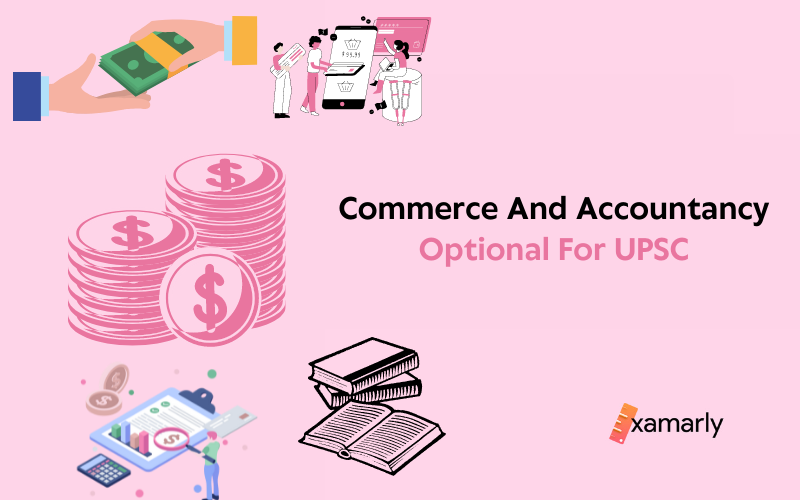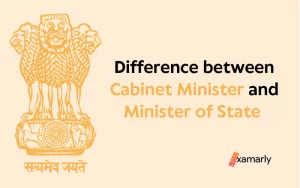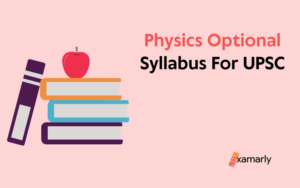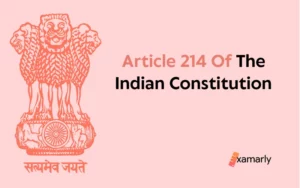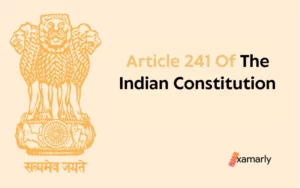Commerce and Accountancy is one of the 48 optional subjects offered by UPSC. Complete Commerce and Accountancy optional for UPSC has a detailed syllabus distributed over two papers: Paper 1 contains topics as Financial Accounting, Cost Accounting, Taxation, Auditing, Financial Management, and Financial Markets and Institutions and Paper 2 covers topics as Organizational Theory, Organisation Behavior, Human Resource Management and Industrial Relations. Paper 1 is considered mix of theory and practice whereas Paper 2 is more theory-based.
- Comparison/Similarity With Other Optional Papers
- Detailed syllabus for Paper 1 and Paper 2 of Commerce and Accountancy Optional
- Advantages Of Commerce and Accountancy Optional For UPSC
- Mastering The Subject From Basics
- Detailed Syllabus Of Commerce And Accountancy Optional For UPSC
- PAPER-I
- Accounting and Finance, Accounting, Taxation & Auditing
- Financial Management, Financial Institutions, and Markets
- 1. Financial Management
- 2. Financial Markets and Institutions:
- PAPER-II
- Human Resources Management and Industrial Relations
- Importance Of Academic Background
- What Time Duration Is Required For Preparation?
- Overlapping Syllabus With GS 2 and 3
- Help With Essay paper
- Help In Interview
- Disadvantages
- Recent Toppers Of UPSC CSE With Commerce and Accounting Optional
- Data/Scores Available
- Standard References
- Conclusion
- FAQs
Comparison/Similarity With Other Optional Papers
In terms of dynamicity, Commerce and Accounting is almost static. Although Paper 1 poses some practical questions whose answers are subject to change with time, overall the subject has more theory questions, less practical questions as compared to International Relations, etc.
The theory questions in paper 2 requires much practice but promises very good results. Consolidated notes across entire theory paper can be extremely helpful in answer writing. As a rule of the thumb, like all other optional subjects, visionary notes also become extremely important for memorization and answer writing in the exam.
Detailed syllabus for Paper 1 and Paper 2 of Commerce and Accountancy Optional
The link to the detailed syllabus of the optional paper of Commerce and Accountancy is provided herein. Click the following link.
Advantages Of Commerce and Accountancy Optional For UPSC
1. Objective nature: Commerce and Accounting is a technical subject, which reduces the probability of a subjective bias on part of the examiner’s marking preferences and increases the chance of getting higher marks in the optional.
2. Staticity: As mentioned above, the subject is relatively static and deals less with speculative current affairs. Thus, the candidate will be good to go with a systematic approach to have good command over the subject, even though the syllabus seems lengthy and time consuming.
3. Higher chances of Selection: As per the marking scheme trend observed in the case of Optional papers, two candidates with the same optional having the same proficiency is marked the same. In other words, there is no cutting edge for either of the candidates. However, in Commerce and Accounting, we see a different pattern as there is a smaller crowd. With the mastery of topics covered in both the papers, given the objective nature of the paper, Commerce and Accounting can be a very good scoring subject for commerce graduate students.
4. Relatively predictable nature: Numericals in Commerce subject are generally predictable and thus scoring prospect in the optional paper becomes strong.
Mastering The Subject From Basics
A topper proof strategy to prepare Commerce and Accountancy Optional For UPSC
- Break the syllabus into smaller fragments. Structure the enormous knowledge into strong and weak topics.
- Solve the practical questions repeatedly.
- Revise theory questions and answers extensively. Make handwritten notes for minute preparation. As exams approach, revise the previous notes diligently.
- Practice diagrams and flowcharts to obtain maximum marks.
- Make your answer comprehensive. Avoid framing the entire answer in long paragraphs. Create visual appeal by adding relevant diagrams.
- Attempt Mock tests. Solve previous year question papers.
- Follow previous year question papers. Assess the weightage of topics and exam pattern. Focus on Syllabus-centric topics. Cut down unnecessary topics.
- Read daily newspaper to remain updated on the major shifts in business and commerce.
Detailed Syllabus Of Commerce And Accountancy Optional For UPSC
PAPER-I
Accounting and Finance, Accounting, Taxation & Auditing
1. Financial Accounting
Accounting as a Financial Information System; Impact of Behavioural Sciences. Accounting Standards e.g., Accounting for Depreciation, Inventories, Research and Development Costs, Long-term Construction Contracts, Revenue Recognition, Fixed Assets, Contingencies, Foreign Exchange Transactions, Investments and Government Grants, Cash Flow Statement, Earnings Per Share.
Accounting for Share Capital Transactions including Bonus Shares, Right Shares, Employees Stock Option and Buy-Back of Securities.
Preparation and Presentation of Company Final Accounts. Amalgamation, Absorption, and Reconstruction of Companies.
2. Cost Accounting
Nature and Functions of Cost Accounting. Installation of Cost Accounting System. Cost Concepts related to Income Measurement, Profit Planning, Cost Control, and Decision Making.
Methods of Costing: Job Costing, Process Costing, Activity Based Costing. Volume – cost – Profit Relationship as a tool for Profit Planning.
Incremental Analysis/ Differential Costing as a Tool of Pricing Decisions, Product Decisions, Make or Buy Decisions, Shut-Down Decisions, etc.
Techniques of Cost Control and Cost Reduction: Budgeting as a Tool of Planning and Control. Standard Costing and Variance Analysis.
Responsibility Accounting and Divisional Performance Measurement.
3. Taxation
Income Tax: Definitions; Basis of Charge; Incomes which do not form part of Total Income. Simple problems of Computation of Income (of Individuals only) under Various Heads, i.e., Salaries, Income from House Property, Profits and Gains from Business or Profession, Capital Gains, Income from other sources, Income of other Persons included in Assessee’s Total Income.
Set – Off and Carry Forward of Loss.
Deductions from Gross Total Income. Salient Features/Provisions Related to VAT and Services Tax.
See Also – Management Optional Syllabus For UPSC
4. Auditing
Company Audit: Audit related to Divisible Profits, Dividends, Special investigations, Tax audit. Audit of Banking, Insurance, Non-Profit Organizations, and Charitable Societies/Trusts/Organizations.
Financial Management, Financial Institutions, and Markets
1. Financial Management
Finance Function: Nature, Scope, and Objectives of Financial Management: Risk and Return Relationship. Tools of Financial Analysis: Ratio Analysis, Funds-Flow, and Cash-Flow Statement.
Capital Budgeting Decisions: Process, Procedures, and Appraisal Methods. Risk and Uncertainty Analysis and Methods.
Cost of capital: Concept, Computation of Specific Costs, and Weighted Average Cost of Capital. CAPM as a Tool of Determining Cost of Equity Capital.
Financing Decisions: Theories of Capital Structure – Net Income (NI) Approach, Net Operating Income (NOI) Approach, MM Approach, and Traditional Approach. Designing of Capital structure: Types of Leverages (Operating, Financial and Combined), EBIT- EPS Analysis, and Other Factors.
Dividend Decisions and Valuation of Firm: Walter’s Model, MM Thesis, Gordan’s Model Lintner’s Model. Factors Affecting Dividend Policy.
Working Capital Management: Planning of Working Capital. Determinants of Working Capital. Components of Working Capital Cash, Inventory, and Receivables.
Corporate Restructuring with focus on Mergers and Acquisitions (Financial aspects only).
2. Financial Markets and Institutions:
Indian Financial System: An Overview Money Markets: Participants, Structure, and Instruments. Commercial Banks. Reforms in the Banking sector. Monetary and Credit Policy of RBI. RBI as a Regulator.
PAPER-II
Organization Theory and Behavior, Human Resource Management and Industrial Relations Organization Theory and Behavior
1. Organization Theory
Nature and Concept of Organisation; External Environment of Organizations -Technological, Social, Political, Economical and Legal; Organizational Goals – Primary and Secondary goals, Single and Multiple Goals; Management by Objectives.
Evolution of Organisation Theory: Classical, Neo-classical, and Systems Approach.
Modern Concepts of Organisation Theory: Organisational Design, Organisational Structure, and Organisational Culture.
Organizational Design–Basic Challenges; Differentiation and Integration Process; Centralization and Decentralization Process; Standardization / Formalization and Mutual Adjustment. Coordinating Formal and Informal Organizations. Mechanistic and Organic Structures.
Designing Organizational structures–Authority and Control; Line and Staff Functions, Specialization, and Coordination.
Types of Organization Structure –Functional. Matrix Structure, Project Structure. Nature and Basis of Power, Sources of Power, Power Structure, and Politics. Impact of Information Technology on Organizational Design and Structure.
Managing Organizational Culture.
2. Organization Behavior
Meaning and Concept; Individual in organizations: Personality, Theories, and Determinants; Perception – Meaning and Process.
Motivation: Concepts, Theories, and Applications. Leadership-Theories and Styles. Quality of Work Life (QWL): Meaning and its impact on Performance, Ways of its Enhancement. Quality Circles (QC) – Meaning and their Importance. Management of Conflicts in Organizations. Transactional Analysis, Organizational Effectiveness, Management of Change.
Human Resources Management and Industrial Relations
1. Human Resources Management (HRM) :
Meaning, Nature and Scope of HRM, Human Resource Planning, Job Analysis, Job Description, Job Specification, Recruitment Process, Selection Process, Orientation and Placement, Training and Development Process, Performance Appraisal and 360° Feed Back, Salary and Wage Administration, Job Evaluation, Employee Welfare, Promotions, Transfers, and Separations.
2. Industrial Relations (IR):
Meaning, Nature, Importance and Scope of IR, Formation of Trade Unions, Trade Union Legislation, Trade Union Movement in India. Recognition of Trade Unions, Problems of Trade Unions in India. Impact of Liberalization on the Trade Union Movement.
Nature of Industrial Disputes: Strikes and Lockouts, Causes of Disputes, Prevention and Settlement of Disputes.
Worker’s Participation in Management: Philosophy, Rationale, Present Day Status, and Future Prospects. Adjudication and Collective Bargaining.
Industrial Relations in Public Enterprises, Absenteeism, and Labour Turnover in Indian Industries and their Causes and Remedies.
ILO and its Functions.
Importance Of Academic Background
A prior academic background in commerce stream, preferably B.Com. Hons. Commerce and Accounting or CA i.e. a complete commerce background is advised since the subject is lengthy and requires in depth understanding of core topics.
What Time Duration Is Required For Preparation?
Since Commerce and Accounting is a lengthy subject, it is advised for the candidate to gather and formulate sound knowledge in subjects in commerce from college graduation level. Also, in dealing with the practical questions of this optional subject, tables and formulations, more practice will yield better results. Candidate should put in equal emphasis on theory part.
Make a proper timetable. Spend at least five hours a day in the optional subject preparations.
Overlapping Syllabus With GS 2 and 3
Candidates will have to take with a pinch of salt the fact that there is not much overlap between commerce and GS papers. However, some overlap can be observed in topics such as Economic Development, Industrial Relations, roles of various statutory international bodies like ILO, the financial aspects and the financing decisions of the government as projected through union budget. .
Help With Essay paper
Essay paper demands variety in forms of knowledge, strategic approach and crocheting of relevant topics. While entire Commerce and accountancy syllabus may not be involved, the candidate can comment on the essay topic from a specialised perspective. For example, one can discuss special investigations on optimal use of tools of planning and control in Indian industries and the recent policies of the government relating to venture capital to answer a question on Atmanirbhar Bharat policy.
The candidate can make innovative interpretations in methods of costing, cost control and decision making, and profit planning for government financial institutions.
When tackling a problem solving question, the candidate can brainstorm along the lines of responsibility accounting of corporate structures linking theories of management of conflicts in organizations, profit planning and human resource planning and fair wage administration with economic growth and development. Laws modifying Industrial relations and their consequential impact on performance of growth and development indicators can also be put to study.
Help In Interview
Like the essay paper, interview is also very versatile. To check the caliber of the candidate in optional paper, the board may ask him/her to comment on organizational effectiveness of project structures of governmental profit and non-profit organizations: how the power structure and politics work underneath and how well it can contribute to job evaluation, employee welfare, promotions, etc.
Profound knowledge relating to financial analysis of public and private investments and Government Grants, mergers and acquisitions between the former, and their resulting impact on foreign exchange transactions can come in handy when asked to comment on economic condition prevailing in the country.
He/she can also provide insights into current affairs solving the problems in Trade Union Legislation, Trade Union Movement and wage administration from a well-informed human resource management perspective.
Interview questions are meant to weigh the level of understanding of the candidate. Mostly the questions cover a broad area. Commerce optional candidates can make use of their deep understanding of subject in commerce to deal with both the particular and generic topics by making meaningful connections among those topics.
Disadvantages
1. Very specialized: Relatively lesser chances of overlap with topics covered in GS 1, 2 and Essay paper.
2. Lengthy: More theoretical part to cover in depth like business model, MM thesis, corporate restructuring, capital structure, project structure and other cost concepts like cost of capital, functions of cost accounting, corporate accounting, etc.
3. Demands expertise: Commerce and accounting optional paper cannot be attempted by all. It demands a certain level of expertise to begin with. That is why only commerce stream students are advised to take up this optional with confidence.
Recent Toppers Of UPSC CSE With Commerce and Accounting Optional
| Nitesh Kumar Jain | AIR 22 | 2020 |
| Shivakshi Dixit | AIR 64 | 2020 |
| Raunak Agrawal | AIR 13 | 2019 |
| Abhishek Jain | AIR 24 | 2019 |
| Shubham Aggarwal | AIR-25 | 2019 |
| Himanshu Nagpal | AIR 26 | 2018 |
| Shivani Goyal | AIR- 15 | 2017 |
Data/Scores Available
| Year | Appeared | Passed | Success Rate Percentage |
| 2019 | 183 | 20 | 10.9 |
| 2017 | 224 | 28 | 12.5 |
| 2016 | 266 | 15 | 5.6 |
| 2015 | 188 | 28 | 14.9 |
| 2014 | 200 | 15 | 7.5 |
Standard References
Listed below are some books which have aided the toppers in their journey to success:
Paper 1
- Corporate Accounting – Naseem Ahmed (Selective Reading)
- Accounting Standards – D.S. Rawat (Focus more on this segment particularly for numerical and have working notes)
- Cost Accounting Theory and Problems – Maheshwari & Mittal (Be selective and study as per the syllabus and equal emphasis should be given to theory as well)
- Student’s Guide to Auditing – Aruna Jha
- Income Tax by Girish Ahuja and VK Singhania
- Financial Management – RP Rastogi
- Indian Financial System – Bharati V Pathak (Relevant chapters only and important to keep a track of initiatives by RBI, SEBI, IRDA etc.)
Paper 2
Organisation Theory and Behaviour – B.P. Singh & T.N. Chabra, SP Robbins
Organisation Behaviour – L.M. Prasad
Human Resource Management – CB Gupta
Industrial Relations – TN Chabra & RK Suri
Conclusion
Optional paper for UPSC IAS Mains Exam must be chosen after ensuring that the candidate has relevant knowledge in that particular subject because optional paper bears 28% weightage to the grand total.
Commerce graduate students can positively benefit from choosing Commerce as Optional subject. With due practice and regular revision, both theory and numerical parts promise enough credits to the candidate and a great boost to the overall score.
Related – Commerce and Accountancy Optional for UPSC | Optional Subject in Commerce
FAQs
What is the weightage of optional subject in UPSC?
The optional subject bears a weightage of 28% to the grand total marks. Paper 1 and Paper 2 are both of 250 marks each and make a total of 500 for the optional.
Which optional subject is the most scoring?
There is no such subject. Choosing the optional subject should differ from individual to individual based on differences in preferences, abilities and specialisation.
How to score maximum in the optional paper?
Write answers like an expert on that particular subject. Make precise points with supporting evidences. Make sure to create visual appeal with plenty of diagrams and flowcharts.
What is the level of difficulty of Commerce and Accountancy optional for UPSC
The syllabus of every optional paper is based on bachelor’s degree level education on that particular subject. So, for Commerce and Accountancy which is a specialised subject, it is advised that the candidate must have at least a B.Com. Honors in Accountancy.


